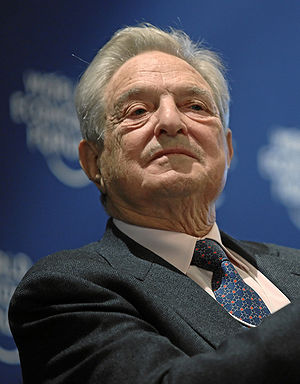 Image via Wikipedia
Image via WikipediaWho gets to make this order? Him, I imagine. From here.
The last time George Soros gave a talk at the Traveller’s Club in Paris, it was just days after Lehman Brothers had collapsed into bankruptcy.
“It was one of the most tense days of my life,” Mr. Soros said on Wednesday while at the club for a talk on global financial regulation sponsored by the French-American Foundation. “The market was on the verge of collapsing. It was touch and go.”
Mr. Soros said he drew several lessons from those turbulent months.
“The world does need order,” he said, “and that order needs maintenance. The idea that markets can correct their excesses turned out to be false.”
He continued: “Perfect order and global governance are not realistic expectations. However, it is a sad fact that Western democracies provide less successful leadership than China.”
Mr. Soros warned that China’s model of state capitalism, in which the interests of the individual are subordinated to those of the government, posed a danger if its example became “the envy of the world.”
Worries about China aside, when Mr. Soros came to Paris this time he was noticeably at ease.
“I’m more relaxed, now that I’m retired,” he said. Mr. Soros stepped down from daily management of his funds in 2000, re-emerging briefly in 2008 to steer them through the financial crisis.
For a man of Mr. Soros’s varied interests, his so-called retirement doesn’t mean rest.
On his present grand tour, he is busy urging the European Union to clean up its financial house. And he is promoting a research group he co-founded, the European Council on Foreign Relations, which advocates a more coordinated foreign policy for the European Union.
“The authors of the euro knew that it was an incomplete construction,” he said. “They could be confident that when deficiencies became apparent, the political will would be there to overcome them. Now, political will is difficult to summon.”
Mr. Soros described an explosive situation in Europe, where a two-speed economy could increase tensions and xenophobia.
Germany and the Scandinavian countries are moving ahead even as fellow members of the euro zone, including Greece and Ireland, slip further behind, crushed by debt and crippled by budget cuts.
That divided Europe, he said, is due to policies “dictated by creditors like Germany.” These creditors have made every effort to avert bank failures and postpone financial restructuring, he said, because they fear a domino effect throughout Europe.
“They are pushing out restructuring for fear of another Lehman,” Mr. Soros said, “by insisting that outstanding debt is sacrosanct.”
Bad private sector debt — for example, that held by Irish banks — was guaranteed by Dublin in 2008 and became a sovereign debt problem. In other words, the Irish taxpayer has been asked to pay bondholders who bet on reckless financial institutions.
“The bondholders are protected because the authorities are worried that the banks can’t take the loss,” Mr. Soros said, but he noted it was “unfair that the taxpayer should be absorbing those losses.”
Instead, he said, Europe should reorganize its rescue mechanism to supervise and protect the banking system across borders. “It should be available also to guarantee banks that become insolvent,” he said.
European leaders are negotiating this month over a euro zone pact that could touch everything from corporate taxes to the legal retirement age. Concessions from debtor nations may be needed if Germany is to back a larger European rescue fund.
Mr. Soros criticized the constraints of the agreement, the details of which are still emerging, but he acknowledged that Germany had its own domestic political situation to consider.
“This is what the German authorities have found possible, and they have found very strong political resistance even to this arrangement,” he said. “I’m very worried about it. It’s going to get worse as time goes on.”
He warned of a lost decade, like that experienced in Latin America after its debt debacle in the early 1980s.
The budgetary crisis unfurling in the United States on a state and municipal level has parallels to the European situation, Mr. Soros said, but is worse in some ways.
“It is exaggerated by political infighting, because the Republicans are engaged in a maneuver of starving the beast for political purposes,” he said, explaining that the G.O.P. was trying to shrink the government by blocking tax hikes, while attacking public employee unions, a major source of funding for the Democrats.
Mr. Soros was also asked about Carl C. Icahn, who sent a letter on Tuesday informing investors that his funds would return all outside capital.
“Given the rapid market run-up over the past two years and our ongoing concerns about economic outlook, and recent political tensions in the Middle East, I do not wish to be responsible to limited partners through another possible market crisis,” Mr. Icahn wrote.
Asked whether he thought Mr. Icahn was right to think that the current market environment posed threats for hedge funds, Mr. Soros said simply: “Carl Icahn has his own problems.”
Mr. Icahn’s former right-hand man, Keith Meister, was reported in December to be planning his own event-driven fund, seeded with $250 million from Soros Funds. The new firm is called Corvex Capital, and it also has attracted Mr. Icahn’s former chief operating officer, Rupal Doshi, Hedge Fund Alert has reported.

This totalitarian scumbag likes order, doesn't he? Order, where HE is in charge.
ReplyDelete